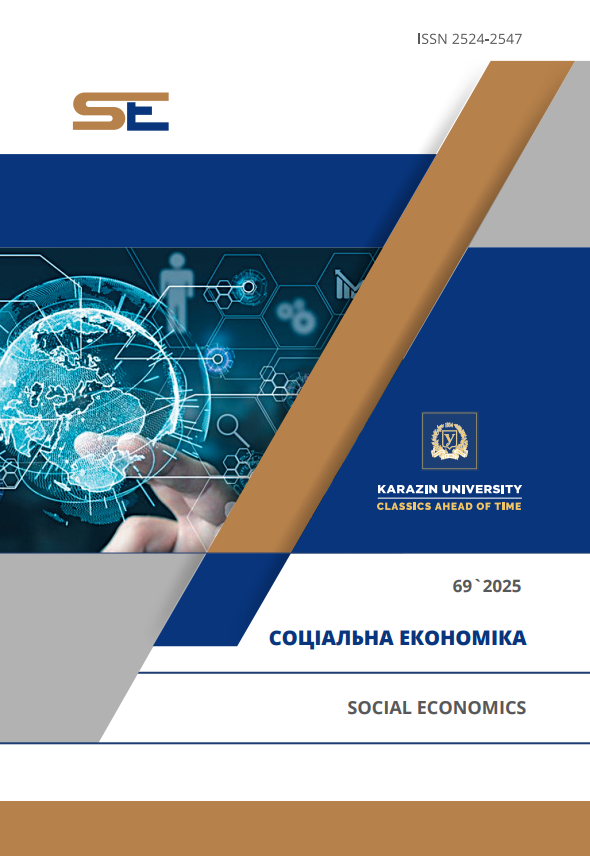IMPACT OF LIFELONG LEARNING PROGRAMS AND BUSINESS DIGITIZATION ON ORGANIZATIONAL ADAPTABILITY
Abstract
The study examines the synergistic impact of lifelong learning (LLL) programs and digitalization on organizational adaptability, focusing specifically on small and medium-sized enterprises (SMEs) within Georgia’s business landscape. In today’s increasingly digital and competitive global market, SMEs face immense pressure to remain agile and innovative. This research emphasizes that the integration of employee development initiatives with digital transformation strategies not only enhances organizational resilience but also improves operational efficiency, enabling businesses to better navigate challenges and seize emerging opportunities.
Digitalization, as a transformative force, has redefined workflows, optimized processes, and expanded market reach for SMEs. However, the benefits of digital transformation can only be fully realized when employees possess the necessary skills to utilize these technologies effectively. Lifelong learning plays a critical role in equipping the workforce with up-to-date knowledge, fostering adaptability, and ensuring employees can leverage digital tools to drive innovation and productivity. By empowering employees through continuous education, organizations can create a culture of proactive learning and technological competence.
Despite their significance to Georgia’s economy, SMEs often encounter barriers to fully embracing digital advancements. These challenges include limited financial resources, inadequate infrastructure, and a lack of structured training programs. As a result, many SMEs struggle to adopt modern technologies and equip their teams with the skills required to sustain competitiveness in a rapidly evolving market. This study highlights these critical gaps and seeks to address how strategic investments in both digital transformation and skill development can enable SMEs to overcome such limitations.
Employing a mixed-methods approach, this research explores how the combination of digital tools and lifelong learning programs contributes to key organizational outcomes, such as enhanced efficiency, streamlined decision-making, and improved employee engagement. It also underscores the role of supportive policies in strengthening the digital and educational ecosystems for Georgian SMEs, offering actionable insights into fostering long-term growth and competitiveness. Ultimately, the findings affirm that aligning continuous education with technological adoption is not just beneficial ‒ it is essential for SMEs to thrive in an ever-changing business environment.
Downloads
References
Alshammari, M. H., & Alenezi, A. (2023). Nursing workforce competencies and job satisfaction: the role of technology integration, self-efficacy, social support, and prior experience. BMC Nurs, 22, 308. doi: https://doi.org/10.1186/s12912-023-01474-8
Dennison, K. (2023). The evolving role of lifelong learning in the digital era. International Journal of Lifelong Education, 42(3), 215–229.
Eling, M., & Lehmann, M. (2018). The impact of digitalization on the insurance value chain and the insurability of risks. Geneva Papers on Risk and Insurance: Issues and Practice, 43(3), 359–396. doi: https://doi.org/10.1057/s41288-017-0073-0
Gobble, M. M. (2018). Digitalization, digitization, and innovation. Research Technology Management, 61(4), 56–59. doi: https://doi.org/10.1080/08956308.2018.1471280
Hagberg, J., Sundström, M., & Egels-Zandén, N. (2016). The digitalization of retailing: An exploratory framework. International Journal of Retail & Distribution Management, 44(7), 694–712. doi: https://doi.org/10.1108/IJRDM-09-2015-0140
Laboissiere, M., & Mourshed, M. (2017). Closing the skills gap: Creating workforce-development programs that work for everyone. McKinsey & Company.
Markovitch, S., & Willmott, P. (2014). Accelerating the digitization of business processes. McKinsey & Company.
Morley, J., Widdicks, K., & Hazas, M. (2018). Digitalization, energy, and data demand: The impact of internet traffic on overall and peak electricity consumption. Energy Research & Social Science, 38, 128–137. doi: https://doi.org/10.1016/j.erss.2018.01.018
Moran, J. (2022, September 29). Over 120 leading EMEA companies choose Coursera to drive digital transformation, cultivate corporate resilience. Coursera Blog.
Parsons, L. (2022, August 23). Why professional development is important. Harvard Professional Development Blog.
Peters, M., et al. (2023). AI and the future of humanity: ChatGPT-4, philosophy, and education – Critical responses.
Smaje, K. (2020, August 12). How six companies are using technology and data to transform themselves. McKinsey & Company.
Marjan Laal, M., & Salamati, P. (2012) . Lifelong learning; why do we need it? Procedia - Social and Behavioral Sciences 31, 399–403. doi: https://doi.org/10.1016/j.sbspro.2011.12.073
Brandi, U., Hodge, S., Hoggan-Kloubert, T., Milana, M., & Morris, T. H. (2024). Temporality and lifelong education and learning. International Journal of Lifelong Education, 44(1), 1–5. doi: https://doi.org/10.1080/02601370.2025.2445435
Håkansson Lindqvist, M., Mozelius, P., Jaldemark, J., & Cleveland Innes, M. (2023). Higher education transformation towards lifelong learning in a digital era – a scoping literature review. International Journal of Lifelong Education, 43(1), 24–38. doi: https://doi.org/10.1080/02601370.2023.2279047
Sarta, A., Durand, R., & Vergne, J.-P. (2021). Organizational Adaptation. Journal of Management, 47(1), 43-75. doi: https://doi.org/10.1177/0149206320929088
Alos-Simo, L., Verdu-Jover, A. J., & Gomez-Gras, J.-M. (2017). How transformational leadership facilitates e-business adoption. Industrial Management & Data Systems, 117(2), 382-397. doi: https://doi.org/10.1108/IMDS-01-2016-0038
Andal-Ancion, A., Cartwright, P., & Yip, G. (2003). The digital transformation of traditional business. MIT Sloan Management Review, July 15, 2003, 34–41. Retrieved from https://sloanreview.mit.edu/article/the-digital-transformation-of-traditional-business/
Andriole, S. J. (2017). Five myths about digital transformation. MIT Sloan Management Review, 58, 19–22.
Omrani, N., Rejeb, N., Maalaoui, A, Dabić, M., & Kraus, S. (2024). Drivers of Digital Transformation in SMEs. IEEE Transactions on Engineering Management, 71, 5030-5043. doi: https://doi.org/10.1109/TEM.2022.3215727
Mick, M. M. A. P., Kovaleski, J. L., Mick, R. L., & Chiroli, D. M. d. G. (2024). Developing a Sustainable Digital Transformation Roadmap for SMEs: Integrating Digital Maturity and Strategic Alignment. Sustainability, 16(20), 8745. doi: https://doi.org/10.3390/su1620874
Skare, M., de Obesso, M. D. L. M., & Ribeiro-Navarrete, S. (2023). Digital transformation and European small and medium enterprises (SMEs): A comparative study using digital economy and society index data. International journal of information management, 68, 102594. doi: https://doi.org/10.1016/j.ijinfomgt.2022.102594
Ulas, D. (2019). Digital transformation process and SMEs. Procedia computer science, 158, 662-671. doi: https://doi.org/10.1016/j.procs.2019.09.101

This work is licensed under a Creative Commons Attribution 4.0 International License.




